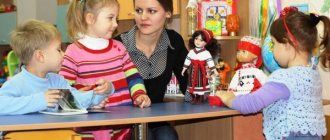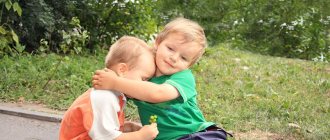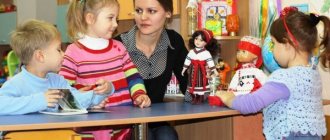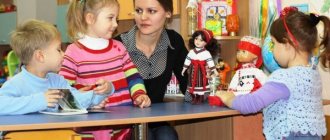Directions of moral development of preschool children
Definition 1
Moral development is the formation in a person of basic moral properties, a meaningful perception of his own personality and its place in the social environment, an understanding of his purpose and the need for continuous improvement of his personality.
Moral development is carried out in the course of moral education.
Moral education is the individual’s assimilation of the fundamentals of morality, the development of moral guidelines for behavior, the assimilation of the fundamentals of the moral functioning of society and the behavioral habits inherent in it.
Moral education is based on moral norms and principles of social behavior. It reflects the continuity of generations and the transfer of social experience.
Are you an expert in this subject area? We invite you to become the author of the Directory Working Conditions
Figure 1. Moral education. Author24 - online exchange of student work
If moral norms are a social category, i.e. they reflect the requirements of society for the behavior of an individual, his compliance with the norms of social interaction, then morality is an internal category, i.e. it is an internal regulator of individual behavior. The moral behavior of an individual in a social environment and its overall development depend on how developed this regulator is.
Moral education begins from an early age of a child. This is relevant because the behavioral habits formed in preschool age become stable foundations of human behavior throughout his life.
Finished works on a similar topic
Course work Moral education of preschool children 460 ₽ Abstract Moral education of preschool children 260 ₽ Test work Moral education of preschool children 220 ₽
Receive completed work or specialist advice on your educational project Find out the cost
The moral education of preschool children is aimed at the formation of an original personality with the skills of social interaction and self-control of behavior. The child must learn to control his actions and actions, express opinions, take into account the needs and interests of another person, develop adequate self-esteem and express his opinions and views, as well as constructively defend his interests in society.
The moral development of a preschooler is focused on the formation of his moral character. The main directions of moral development of a preschooler are:
- Formation of the pupil’s personal properties. It is necessary to create conditions for the disclosure of the natural inclinations of the individual and the disclosure of his potential.
- Moral development of personality. Here, the moral experience of a preschooler’s life is formed, and he masters the experience of social behavior and interaction.
- Developing an adequate attitude towards others: respect for other people’s opinions and points of view, acceptance of someone else’s point of view, different from one’s own, as correct, equality and equivalence of all participants in the social sphere of activity.
- Patriotic education. It is focused on the formation of civic qualities of an individual: love for the Motherland, respect for the customs and traditions of one’s people, awareness of one’s belonging to a particular culture.
- Mastering ethical standards of behavior. They reflect the values of the social environment and the rules of behavior in society, which are unspoken. They are based on the relationship between the interests of the individual and society.
In preschool age, the foundations of moral judgments and assessments are developed. The child comprehends them and learns to apply them in practical activities. In order for a child’s behavior to be formed on the basis of his conditioning by moral norms, it is necessary to organize a system of moral education that takes into account the age-related characteristics of the development of preschoolers and focuses on the social development of the pupil’s personality and his comprehensive humanistic development.
Article: Features of the moral development of children during preschool childhood.
Article. Features of the moral development of children during preschool childhood
Moral development is one of the central lines of mental development in preschool childhood. It involves the formation in unity and interconnection:
— moral consciousness (moral ideas and concepts, knowledge of norms and rules of behavior);
— moral behavior (readiness to act, act in accordance with moral norms and rules);
— moral feelings and relationships (experiences of satisfaction or dissatisfaction from an action performed).
Moral development in early childhood.
Features of a child’s moral development in early childhood:
— the child’s moral development occurs against the background of a positive attitude towards an adult;
— the child’s fulfillment of moral norms and rules of behavior is aimed at establishing positive contacts with adults;
— putting forward a system of demands by adults and teaching the child to fulfill them creates the basis for the child’s moral development;
- the requirements and prohibitions of adults are often violated due to the objective characteristics of the child’s behavior - situational behavior and impulsiveness;
- the child’s moral manifestations are closely related to the emotional attitude towards the object to which they are directed;
- the child develops value judgments (“good”, “bad”), first as an imitation of adults’ assessments, and then as an expression of the child’s attitude towards himself and others;
- moral behavior arises spontaneously, at the prompting of an adult or under the influence of a situation and is not recognized by the child as such;
-the first moral habits and qualities are formed, primarily in everyday and objective activities;
-opportunities are created to bring the child to an awareness of the need to comply with the norms and rules associated with the specific situations in which he is involved.
Moral development in preschool age.
The period of preschool childhood is extremely important from the point of view of the genesis and formation of social norms of the psyche and moral behavior. The predominance of themes related to the image of a person in the work of a preschooler indicates his predominant orientation towards the social environment. This creates a broad basis for the formation of primary forms of socially significant qualities.
Preschool age, occupying a period of time from 3 to 6 years on the scale of a child’s physical development, makes a great contribution to the mental development of the child. Over these years, the child acquires much of what remains with him for a long time, defining him as a person and subsequent intellectual development.
Children are among the first to learn the norms and rules of so-called “everyday” behavior, cultural and hygienic norms, as well as norms related to the attitude towards their responsibilities, observing the daily routine, and handling animals and things. The last moral norms to be learned are those relating to the treatment of people. They are the most complex and difficult for children to understand, and following them in practice is very difficult for children. Role-playing games with rules, common in older preschool age, have a positive impact on the assimilation of such rules. It is in them that the presentation, observation and assimilation of rules take place, their transformation into habitual forms of behavior. At first, children follow the learned norms and rules of interpersonal behavior by imitation (younger preschool age), then they begin to more deeply understand the essence of these rules and norms themselves (senior preschool age). They not only perform them themselves, but also carefully ensure that other children around them follow the same rules and regulations.
The leading type of activity is role-playing play, where the child models behavior, actions, and relationships among adults. It brings to the fore the relationships between people and the meaning of their work. By performing roles, the child primarily masters the sphere of moral norms accepted in human society. Modeling relationships between people in a role-playing game involves the unification of children, in which they contact on the basis of moral standards in order to successfully carry out joint activities. In relationships regarding play, children primarily develop a real level of fulfillment of moral standards.
All moral norms are characterized by the fact that they reinforce a social way of behavior, which preschoolers express as follows: “you can’t deceive adults,” “you can’t offend little ones,” etc. that is, children state what can be done and what cannot be done.
However, moral standards, even those that the child knows well, do not immediately begin to guide his behavior. Initially, they are performed only at the request of an adult or in his presence, and are easily violated by a child. Moreover, the baby does not notice this violation and, while negatively assessing such behavior in general, does not apply the negative assessment to himself.
At the age of 5-7 years, preschoolers move from spontaneous to conscious morality. For them, a moral norm begins to act as a regulator of relationships between people. There is no need for external control over compliance with the norm on the part of an adult. Moral self-regulation of behavior can be either intentional (voluntary) or unintentional (involuntary). With voluntary self-regulation, a person consciously decides to act in accordance with moral requirements and, controlling his behavior, fulfills this intention even in cases where it contradicts his immediate desires. With involuntary self-regulation, a person acts morally because he cannot do otherwise. Moral motives become decisive in behavior. Involuntary moral behavior is more consistent with the conditions of everyday life, which often require immediate action.
Involuntary self-regulation is formed in two ways:
- in the process of accumulating spontaneous moral experience. In this case, children imperceptibly master certain moral norms, certain forms of behavior are reinforced, that is, moral habits are formed. The true moral meaning of these habits is realized by them much later;
- initially voluntarily, under personal control, contrary to other desires, and then more complex moral requirements are involuntarily acquired.
At preschool age, the most favorable conditions are created for the moral development of children. During this period, the child’s system of relationships with adults and peers expands and restructures, types of activities become more complex, and joint activities with peers arise. The child looks closely at the world of adults, beginning to highlight the relationships between people in it. A preschooler comprehends the world of human relations, discovers the laws by which human interaction is built, i.e. norms of behavior. In an effort to become an adult, a preschooler subordinates his actions to social norms and rules of behavior.
In many cases, an older preschooler is able to rationally explain his actions, using certain moral categories; this means that he has developed the beginnings of moral self-awareness and moral self-regulation of behavior.
Thus, the features of the moral development of children in preschool age are expressed in the following judgments:
- children develop their first moral judgments and assessments, an initial understanding of the social meaning of a moral norm;
— the effectiveness of moral ideas increases;
— conscious morality arises, i.e. the child's behavior begins to be mediated by a moral norm.
Tasks of moral education of preschool children
The moral education of preschool children is focused on developing their moral feelings, ideas and guidelines for social activity, as well as behavioral habits and motives for social activity.
The moral education of preschool children is focused on solving two groups of problems:
- Tasks for developing a mechanism for the moral development of a child. This group of tasks is permanent and sustainable. The mechanism of moral development is associated with the choice of forms, methods and technologies for organizing educational activities, aimed at developing moral ideals in students that correspond to a specific stage of socio-economic development of society.
- Tasks to develop certain qualities and social skills in an individual. These tasks reflect the need to achieve a certain level of development of society and meet its needs. At every historical stage in the development of society, it requires people endowed with certain qualities. Therefore, the tasks of this group change in accordance with the dynamics of the development of the social environment.
Moral education of preschoolers is focused on:
- Education of the fundamentals of cultural behavior and cultural interaction in the social environment;
- Developing collective interaction skills;
- Education of the fundamentals of humanism and humane qualities of the individual;
- Fostering hard work;
- Nurturing patriotic qualities.
The concept of family and moral education
The formation of a child’s personality directly depends on the family and moral values in which his parents raised him. It is moral development in the family that instills in the child the main moral character traits, gives an understanding of how to behave correctly in society, with loved ones, and what actions are unacceptable. Of course, children today are greatly influenced by television, social networks, and advertising around them at school. But only moral education in the family can provide that inner core, thanks to which the child will be able to resist negative aspects from the outside.
Spiritual and moral education of the individual is a developmental stage through which the child develops the basic concepts of intrapersonal culture. Through them the process of establishing a person as an individual occurs. There is a formation of values and ideals that contribute to the future creation of a certain worldview in a person. The spiritual and moral education of the child also determines what his life position will be - active or passive.
In order to raise a worthy, morally educated person, it is important to participate in the formation of the personality of not only parents, but also the school, society, and surrounding people. But the main educational function, of course, is performed by the family.
According to psychologists, the best example for a child is personal example. Therefore, it is believed that the moral development of an individual in a family begins with the behavior of adults in everyday life, their relationships with others, and their attitude to business.
3 important steps
which every woman should go through
Anika Snagovskaya
Author and presenter of women's trainings on harmonizing feminine energy. Master of removing limiting beliefs and master of constellations.
I have prepared three lessons for you that will help you better understand yourself, remove the restrictions that prevent you from feeling loved and living happily.
01
Video lesson with meditation: 5 states of femininity
You will learn about 5 female states that exist in every woman, how they manifest themselves and which archetypes are most manifested in you and which are not developed.
02
Video lesson + meditation: How to let go of past relationships
I’ll tell you what you need to do to free your heart from old feelings and break the energy threads connecting you with your past partner.
03
Audio recording: Neuro-af
Thanks to this neuro-affirmation, you can regain self-love and feel sincere gratitude and happiness for every day.
✕
Top 3 useful materials that will help you know yourself better
And start a new, happy life for yourself.
Video lesson with meditation: 5 states of femininity
Video lesson + meditation: How to let go of past relationships
Audio recording: Neuro-af
Take your gifts!
From early childhood, the child observes his parents, repeats their behavior, tries to imitate everything, and adopts habits. There is no other example in his life, therefore any form of interaction between elders is perceived as the only correct one. Even kids always feel the situation in the family, how mom and dad treat each other. It's about the intonation with which they communicate with each other; manner of communication, timbre of voice during a conversation. Any actions, life episodes, situations in the family and ways to solve them affect the child’s psyche now and will affect them in the future. Parents play such an important role in shaping a child's attitude towards everything that surrounds him.
Thus, the purpose of moral education is the development of clear moral requirements and rules.







